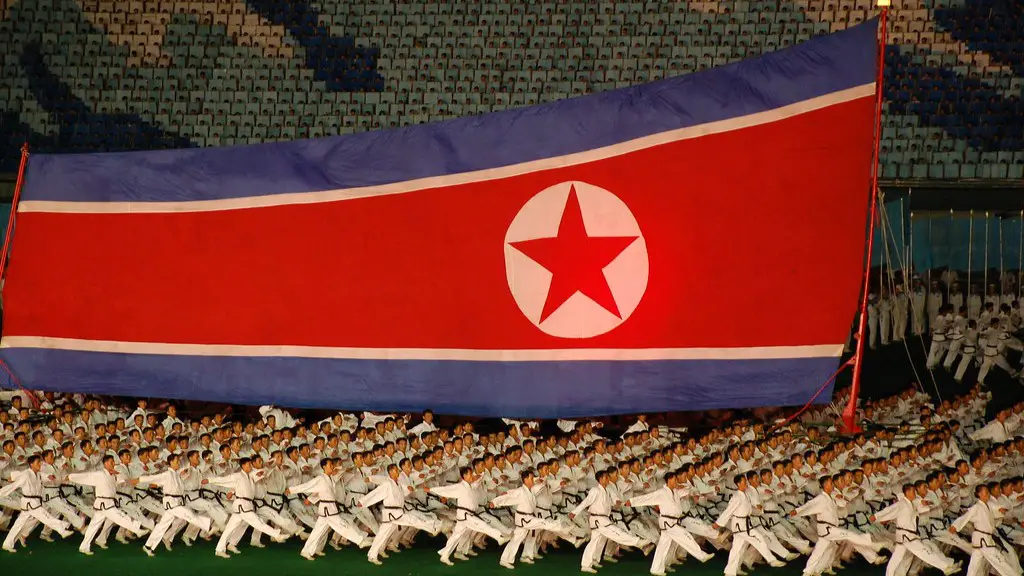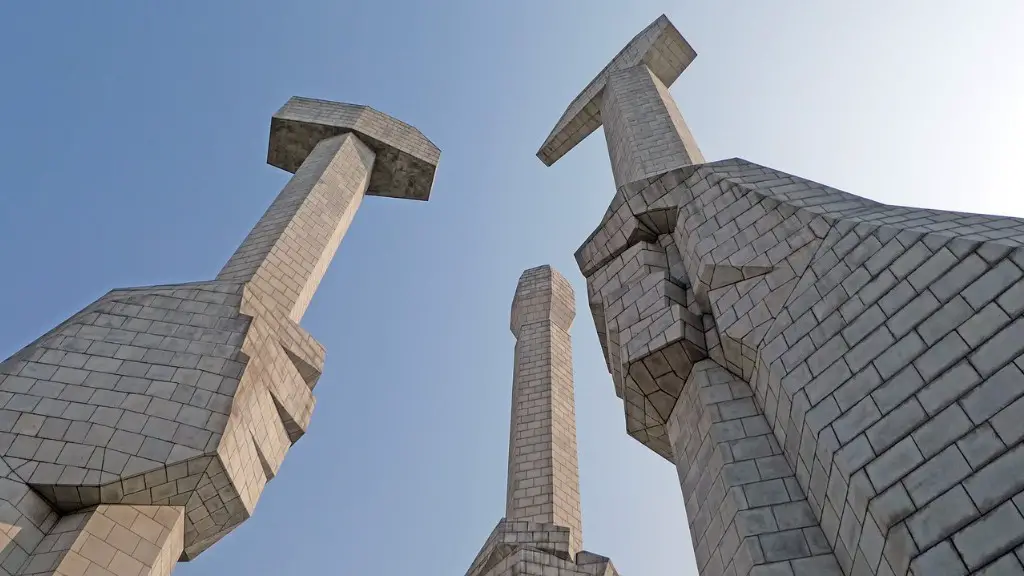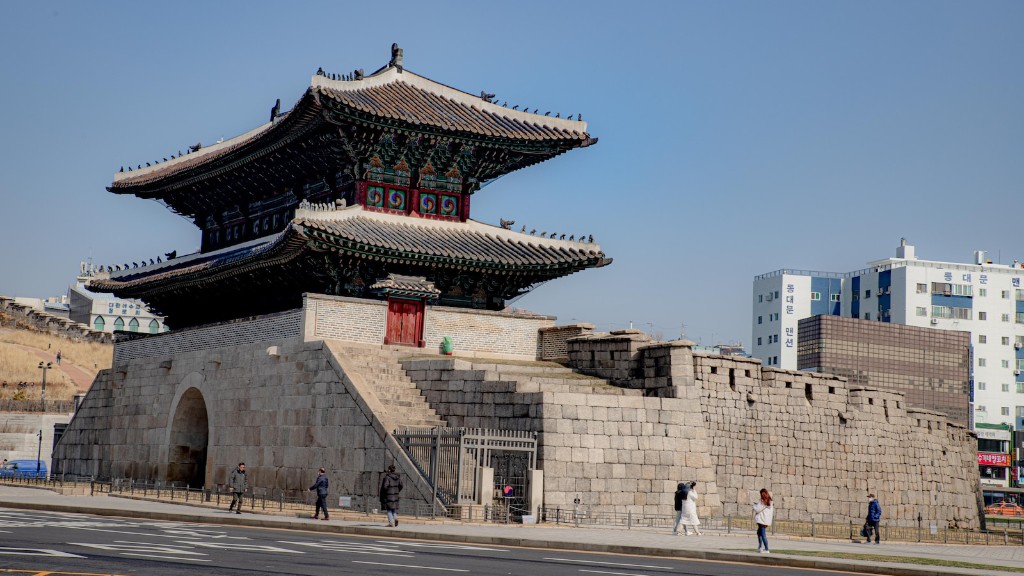North Korea-USA Confrontation Dynamics
For decades the United States and North Korea have been opponents, trapped in an icy stalemate of conflicting ideologies and political interests. The US has maintained a long-term strategic presence in the region, ensuring that its own security interests and those of its allies are kept safe. North Korea meanwhile, has evolved itself into a ruthless, authoritarian regime that values stability, even in the face of international repercussions.
On both sides, the potential for open confrontation has been met with caution. However, in light of recent events such as North Korea’s continued development of nuclear weapons, the discussion of a potential conflict has been increasingly emphasized in the media. As North Korea’s nuclear capabilities threaten the security of the entire region, the question of whether the US could successfully engage in a war with North Korea is being brought to the forefront.
Noted experts have suggested that any open conflict between the two countries would be a difficult and potentially highly destructive affair. North Korea’s large, well-trained army, coupled with their extreme willingness to use unconventional tactics, makes them a formidable opponent. The US, meanwhile, has an impressive arsenal of air, land, and sea power, as well as a long-standing history of military success in the region. Experts suggest that if a conflict were to take place, the US would likely have the advantage, though only narrowly.
For the US, engaging in a war with North Korea would come with a considerable cost. Not only would the US be dealing with an aggressive and potentially heavily armed adversary, but they would also have to grapple with the possibility of a long-term drawn out conflict, which could be both politically and economically damaging. Furthermore, the US would also have to consider the potential for North Korean retaliation, which could range from a missile attack to attempts to destabilize South Korea, to even the use of chemical and biological weapons.
In terms of potential outcomes, experts suggest that although the US would likely have the upper hand militarily speaking, the consequences for both sides, let alone the region, could be devastating. The potential for civilians to become embroiled in the conflict is also a cause for concern, as North Korea has been known to use its own population, even children, as a shield against external forces.
Ultimately, any decision to initiate hostilities with North Korea must be taken with the utmost care. Given the alarming rhetoric coming from both sides and the potential for catastrophic outcomes, it is clear that the current situation requires careful management, rather than open confrontation.
North Korean Missile Capabilities
One of the biggest threats posed by North Korea is their ever-growing arsenal of missiles. Although the US is confident in their own missile defense systems, North Korea has a wide range of short and long-range ballistic missiles that could be used to target US territories, bases and allies in the region.
The threat these weapons pose is compounded by the fact that North Korea has not been transparent about its missile capabilities. In fact, despite multiple attempts to negotiate over limiting their nuclear program, analysts have suggested that North Korea may have developed far more sophisticated missile technologies than previously thought.
In addition, North Korean missiles are notably difficult to intercept, as even the most advanced missile defense systems cannot guarantee that all incoming rockets can be destroyed. Not only that, but a potential North Korean attack would also require a speedy response, as the country’s missiles can reach their targets in as little as 15-20 minutes following launch.
Given these facts, any conflict between the US and North Korea would pose a considerable risk to US interests and those of its allies. This is a risk that the US would be very reluctant to take, as any missed missile would almost certainly result in widespread destruction.
The rise in North Korea’s missile capabilities has also forced the US to reassess its own strategic thinking. The US is now looking to deploy additional ballistic missile defense systems in the region, as well as working to address the threats posed by North Korea’s submarine-launched missiles.
Geopolitical Implications
Due to North Korea’s ties to many of its regional neighbours, a war with the US could carry dire geopolitical consequences. Many of North Korea’s neighbours, including China and Russia, have powerful interests in the region, and the US would need to consider the potential implications of such a conflict with regards to these countries.
Shockwaves in the region could also spread to neighbouring countries such as Japan and South Korea. In particular, South Korea is extremely close to North Korea, and any potential conflict could have significant repercussions for the population of the country. This could include a mass exodus from the North to the South, leading to an unprecedented humanitarian crisis.
Furthermore, North Korea’s regional allies have stressed the importance of dialogue and diplomacy in resolving the current stand-off between the US and North Korea. If a conflict were initiated, then it is possible that these nations could further their support for North Korea, leading to further escalation that neither side would want to risk.
Ultimately, this may explain why the US has so far pursued a measured response to the crisis rather than escalating tensions with North Korea. Although the US is undeniably capable of engaging in a war with North Korea, the potential cost – both in terms of human and financial capital – may be too great to bear.
North Korean Military Tactics
Another consideration for the US is North Korea’s unconventional military tactics. Although North Korea has a formidable military, their persistent use of guerilla warfare and asymmetrical tactics could be a decisive factor in any confrontation with the US.
North Korea has developed a host of asymmetrical tactics which could be used against the US. This includes the use of underground bunkers, tunnels and hideouts, which are designed to protect North Korean forces from aerial bombardment. The country has also been known to use human shields in order to guard their military installations and reduce the number of casualties suffered during combat.
These tactics make North Korea an unpredictable opponent and would force the US to adjust their tactics accordingly. In particular, the US would have to closely monitor the movements of North Korean forces in order to better understand their tactics and strategy. This could prove extremely difficult given the secretive nature of the country and the harsh terrain in which they often operate.
The US would also need to be aware of the risk of friendly fire and consider the potential for collateral damage. North Korea is willing to take extreme measures to protect itself and its people, and the US would have to be mindful of this fact when trying to determine a suitable course of action.
North Korean Diplomacy
One of the most important aspects of the current situation between the US and North Korea is the role of diplomacy. Despite the two countries’ long-standing animosity, US leaders and North Korean officials have maintained a series of meetings and negotiations in recent years. Although these efforts have yet to bear fruit, they are considered to be integral in maintaining peace and avoiding confrontation.
US officials have also been clear in their messaging to North Korea, noting that the US is willing to engage with the country, but only under certain conditions. These conditions include complete denuclearization and greater transparency from North Korea, two goals that US diplomats and leaders are hopeful can be achieved through peaceful dialogue.
However, North Korean officials have been far less receptive to US efforts to engage, and some have even suggested that North Korea is using these meetings as a means to probe potential weaknesses in the US’ negotiating position. As such, it is possible that these discussions may not bring about the necessary results for the US, and further conflict may be unavoidable.
In the face of North Korean intransigence, the US must remain steadfast in its diplomatic efforts. While there is no guarantee of success, it is still the most viable path for the US to take in order to avoid war with North Korea.
The Role of China
Although the US is the primary opponent of North Korea, China also plays a crucial role in the current crisis. As North Korea’s closest ally, China has long been seen as a possible mediator between the US and North Korea. China is also highly critical of North Korea’s nuclear program and has been a vocal critic of the US’ attempts to escalate tensions.
In the past, Chinese officials have used their influence over North Korea to push for a diplomatic resolution to the crisis. They have done so through a combination of economic assistance and diplomatic pressure, both of which have had varying degrees of success. However, it is unclear if China still has the same level of influence over North Korean leadership as before.
Any confrontation between North Korea and the US would have significant implications for China. In the event of a US-North Korean war, China could be an important ally to North Korea, providing them with diplomatic and possibly even military support. This would further complicate the situation and put China’s own relations with the US under strain.
Despite this, China’s potential role in a potential conflict should not be overstated. While China has some influence over North Korea, it is by no means absolute and any conflict may lead to unpredictable consequences for the region.
Domestic Factors in North Korea
The current crisis with North Korea is also complicated by a number of domestic factors which could have far-reaching implications for any potential conflict. North Korea is led by a ruthless and oppressive regime which has shown little regard for the human rights of its own people. This has made it difficult for the US to distinguish between civilians and military personnel, further complicating the situation.
The political stability of the regime is also a major factor in any potential conflict. A sudden collapse of the government could lead to a power vacuum which could be filled by hostile outside forces. This would put US interests at risk and could lead to further chaos and instability in the region.
The US must also consider the effect a war with North Korea could have on the North Korean people. While the US is confident in its capabilities, any conflict would likely result in many innocent lives being lost on both sides. This could have devastating consequences for the people of North Korea and may lead to a resurgence in support for the regime.
The US has taken steps to ensure that humanitarian aid can reach the people of North Korea, but this is only a temporary solution. In order to truly address the crisis, it is important that a more lasting solution is found.
International Involvement
The current situation between the US and North Korea has not gone unnoticed by the international community. Many world leaders have condemned North Korea’s nuclear program and demanded a diplomatic solution. This has led to a number of international initiatives aimed at resolving the crisis and eliminating the threat posed by North Korea.
The US has also sought help from its allies, including China and South Korea. These countries have some influence over North Korea and could be critical in finding a diplomatic solution. In addition, the US has worked with the United Nations to impose sanctions on North




